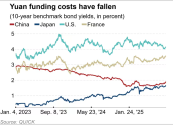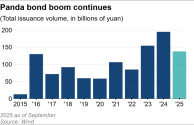You are using an out of date browser. It may not display this or other websites correctly.
You should upgrade or use an alternative browser.
You should upgrade or use an alternative browser.
Renminbi (RMB)/Yuan Appreciation & Internationalization
- Thread starter supercat
- Start date
The yuan rose to 8.5% of global transactions this year, up from 7% in 2022.
Global trading of the Chinese yuan has surged to $817 billion a day, extending a decade-long trend with volumes nearing those of the British pound, according to the Bank for International Settlements. The now makes up 8.5% of global currency transactions, up from 7.0% in 2022, according to the BIS’s triennial survey. While it remains the fifth-most traded currency, it closed the gap with fourth-placed sterling, whose share fell from 12.9% to 10.2%.
my thread on the entire BHP showdown from this week. This is big if they can get all the Australian trades done in RMB. Fortescue is already play ball, so BHP is the baddie here if you are China.
Kenya has converted roughly $3.5 billion in USD loans to RMB. Specific figures were not provided.
NAIROBI, Oct 7 (Reuters) - Kenya has completed converting three railway construction dollar-denominated loans from China into yuan in order to save on interest payments, its Finance Minister John Mbadi said on Tuesday. The swap, which allows the floating, dollar-based interest rates across the three loans from China Exim Bank to drop into their lower, yuan-based rates, will save the country about $215 million a year, Mbadi told reporters.
Indian refineries are making oil payments to Russia in yuan. It should be noted that political tensions have cast a shadow over such transactions in the past. The recent thaw will hopefully ameliorate the issue.
NEW DELHI/SINGAPORE, Oct 7 (Reuters) - Traders offering Russian oil have begun asking Indian state refiners to pay in Chinese yuan, taking recent signs of improving relations between New Delhi and Beijing as a chance to simplify deals with Indian buyers, trade sources said. India's top refiner, state-controlled Indian Oil Corp , recently made payments in Chinese currency for two to three cargoes of Russian oil, people familiar with Indian companies' Russian oil purchases said.
In 2023, Indian state refiners made some payments for Russian oil in yuan, but they stopped due to displeasure from the Indian during a period of heightened tensions with Beijing, though private refiners continued to use the Chinese currency. Now, traders, which until now had to convert payments in dirhams or dollars into yuans - since only those can be directly exchanged into roubles needed to pay the producers - are seeking to remove one costly step from the process, one trader said.
Seriously, that border issue is a big stumbling block between India and China. As long as that is not resolved, the 2 countries can never have normal relations anymore, especially since the recent clashes, before that things had long calm down and both sides had basically put the issue on freeze and focused on economic/trade and investments between both sides, but the clash cancelled all this advances back to zero. Will be interesting to see when they can really reach an agreement on this issue in future.Indian refineries are making oil payments to Russia in yuan. It should be noted that political tensions have cast a shadow over such transactions in the past. The recent thaw will hopefully ameliorate the issue.
very interesting article here on RMB settlement
basically, 70% of soybean trade between China and Brazil in 2024 was already in rMB and same with 100% of sales from Argentina. Bolivia and Uruguay are actively joining CIPS.3. 2023年3月,中巴宣布大豆贸易可弃用美元、直接以人民币/雷亚尔结算,2024年巴西供华大豆中约七成已用人民币计价付汇。阿根廷2025年出口中国的首批大豆100%采用人民币结算,官方称“金砖机制下人民币结算比例已达68%”。乌拉圭、玻利维亚等新兴供应方也在积极接入CIPS,南美进展不错,卖大豆收人民币没问题。但美国是不肯用人民币的,还是用美元买美国大豆,占比约20%多点。
4. 总体来说,大豆人民币结算占比约50%,但比例会快速上升。一个是可能彻底不买美国大豆了,这部分就没了。再一个,对巴西、阿根廷等国的“长协”,以前用美元签的不能立刻换人民币,但续签的时候会换成人民币结算。2026年中国购买大豆将超过60%以人民币结算,人民币主导地位有了。大豆算是推得顺的,主要是巴西占了70%的进口,两国谈好就没事了,美国的干脆不买算了。
5. 铁矿石方面,情况要复杂些,目前人民币结算只占20%。已经在升了,2023年不到10%,2025年到最后可能是25%,2026年可能是30%,进展坚决但不能着急。主要是因为,铁矿石有60%是从澳大利亚进口的,关系好的巴西只占22%。和澳大利亚推进人民币结算,不会太顺。
6. 技术性来说,铁矿石和大豆都有“年度长协”这种买卖方法,大供应商和中国买家签一年的固定价格,下年又谈判。澳大利亚大卖家一向是美元结算的,从卖家角度避免汇率风险。这种情况不能强行说改人民币结算,必然是给出“人民币结算选项”,让卖家收人民币试试。2024年淡水河谷、力拓、FMG合计向中国钢厂售出约8000万吨人民币计价矿,而中国进口了12.37亿吨铁矿,这只占一小部分。人民币结算的主力是现货贸易,卖家运到中国港口来卖,100%人民币结算。印度、南非、乌克兰等中小卖家在中国港口卸货,人民币“一手交钱一手交货”,价格就随中国大商所期货波动。大卖家能要求用美元,但试水人民币结算,中小卖家没资格谈长协,就听中国的用人民币。有时中国买家主动找人家还没运过来的货(不在长协里的),用美元下单。
7. 要注意,中国还没有对铁矿石大卖家要求“必须人民币结算”,仍然是美元为主,但中国谈判中争取增加人民币结算份额。美资背景多的必和必拓当了刺头,基本拒绝人民币结算(试了10万吨就没下文了),还想提价。因此就对其下了强硬通牒,9月30日让国内钢企暂停采购任何以美元计价的必和必拓海运铁矿。想续签,就必须以人民币结算,否则“不谈、不接货”。这是谈判要求,暂停采购不是永久,也许谈了就和别家差不多,部分人民币部分美元,各自妥协下。总体来说,还没有搞全面切换,而是推人民币。
In total, 50% of soybean trade is done in RMB. In 2026, China will buy 60% of soybean in RMB, so it's easy to do the payment in RMB.
Iron Ore trade is much lower. just 20% payment in RMB, which is still higher than the 10% in 2023. Basically, seems like BHP especially insist on doing trade in USD, hence the recent fight.
FMG (fortescue) and Rio Tinto are a lot more open to RMB and same with all the medium and smaller iron ore producers.
separate article
Fortescue is not only willing to take RMB payment but also had a loan of 14.2B RMB with BOC and ICBC to pay for Chinese green machinery in its mines. So China is clearly going to favor FMG when possible.与此同时,为了争夺中国市场,全球三大铁矿企业中排名前两位的巴西淡水河谷、澳大利亚力拓已经和中国谈好了人民币结算。巴西淡水河谷还打算扩产,巩固自己的排名。
全球第四大铁矿企业澳大利亚矿业巨头
(FMG)不但同意人民币结算,还在8月向包括中国银行和中国工商银行的中国资本申请了142亿元(约合20亿美元)人民币银团定期贷款进行扩张。
FMG董事长表示,这不仅仅是一笔金融交易,而是一个信号,表明当合作伙伴志同道合时,可以实现什么。在美国放弃投资世界上最伟大的产业之际,中国和福特斯克金属集团正在推进引领全球绿色工业革命所需的绿色技术。
看来FMG已经准备好,要当新的全球第三了。


